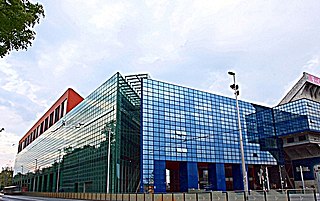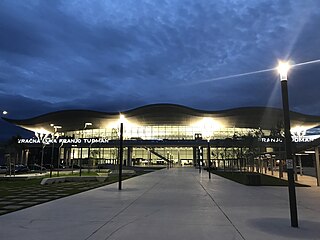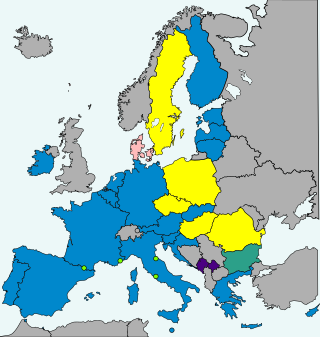
The Balkans, corresponding partially with the Balkan Peninsula, is a geographical area in southeastern Europe with various geographical and historical definitions. The region takes its name from the Balkan Mountains that stretch throughout the whole of Bulgaria. The Balkan Peninsula is bordered by the Adriatic Sea in the northwest, the Ionian Sea in the southwest, the Aegean Sea in the south, the Turkish straits in the east, and the Black Sea in the northeast. The northern border of the peninsula is variously defined. The highest point of the Balkans is Musala, 2,925 metres (9,596 ft), in the Rila mountain range, Bulgaria.

Croatia, officially the Republic of Croatia, is a country located at the crossroads of Central and Southeast Europe. Its coast lies entirely on the Adriatic Sea. It borders Slovenia to the northwest, Hungary to the northeast, Serbia to the east, Bosnia and Herzegovina and Montenegro to the southeast, and shares a maritime border with Italy to the west. Its capital and largest city, Zagreb, forms one of the country's primary subdivisions, with twenty counties. Other major urban centers include Split, Rijeka and Osijek. The country spans 56,594 square kilometres, and has a population of nearly 3.9 million.

Zagreb is the capital and largest city of Croatia. It is in the north of the country, along the Sava river, at the southern slopes of the Medvednica mountain. Zagreb stands near the international border between Croatia and Slovenia at an elevation of approximately 158 m (518 ft) above sea level. At the 2021 census, the city itself had a population of 767,131, while the population of Zagreb urban agglomeration is slightly above one million people.

The Croats are a South Slavic ethnic group native to Croatia, Bosnia and Herzegovina and other neighboring countries in Southeastern Europe who share a common Croatian ancestry, culture, history and language. They are also a recognized minority in a number of neighboring countries, namely Austria, the Czech Republic, Germany, Hungary, Italy, Montenegro, Romania, Serbia, Slovakia and Slovenia.
Croatia Airlines Ltd. is the flag carrier of Croatia. Its headquarters are in Buzin near Zagreb, the capital, and operates domestic and international services mainly to European destinations. Its main hub is Zagreb International Airport with focus cities being Dubrovnik, Split, and Zadar. Since November 2004, the airline has been a member of Star Alliance.

The Federation of Bosnia and Herzegovina is one of the two entities composing Bosnia and Herzegovina, the other being Republika Srpska. The Federation of Bosnia and Herzegovina consists of ten autonomous cantons with their own governments and legislatures.

The Yugoslav Wars were a series of separate but related ethnic conflicts, wars of independence, and insurgencies that took place in the SFR Yugoslavia from 1991 to 2001. The conflicts both led up to and resulted from the breakup of Yugoslavia, which began in mid-1991, into six independent countries matching the six entities known as republics that had previously constituted Yugoslavia: Slovenia, Croatia, Bosnia and Herzegovina, Montenegro, Serbia, and Macedonia. SFR Yugoslavia's constituent republics declared independence due to unresolved tensions between ethnic minorities in the new countries, which fuelled the wars. While most of the conflicts ended through peace accords that involved full international recognition of new states, they resulted in a massive number of deaths as well as severe economic damage to the region.

The Bosnian War was an international armed conflict that took place in Bosnia and Herzegovina between 1992 and 1995. The war is commonly seen as having started on 6 April 1992, following a number of earlier violent incidents. The war ended on 14 December 1995 when the Dayton accords were signed. The main belligerents were the forces of the Republic of Bosnia and Herzegovina, the Republic of Herzeg-Bosnia, and the Republika Srpska, the latter two entities being proto-states led and supplied by Croatia and Serbia, respectively.
The Croatia national football team represents Croatia in international football matches. It is governed by the Croatian Football Federation (HNS), the governing body for football in Croatia. It is a member of UEFA in Europe and FIFA in global competitions. The team's colours reference two national symbols: the Croatian checkerboard and the country's tricolour. They are colloquially referred to as the Vatreni (Blazers) and Kockasti.

The Turkey national football team represents Turkey in men's international football matches. The team is controlled by the Turkish Football Federation, the governing body for football in Turkey, which was founded in 1923 and has been a member of FIFA since 1923 and UEFA since 1962.

Hrvatski nogometni klub Rijeka, commonly referred to as NK Rijeka or simply Rijeka, is a Croatian professional football club from the city of Rijeka.

Nogometni klub Slaven Belupo, often referred to as NK Slaven Belupo, Slaven Belupo or simply Slaven, and known internationally as NK Slaven Koprivnica, is a Croatian professional football club based in the city of Koprivnica in the north of Croatia. They play their home matches at Gradski stadion in Koprivnica.

Maksimir Stadium is a multi-use stadium in Zagreb, Croatia. Named after the surrounding neighbourhood of Maksimir, it is one of the largest stadiums in the country with a current seating capacity of 25,912 and a maximum possible capacity of 35,423. It is the home stadium of Croatian club Dinamo Zagreb and has been used since 1990 by the Croatia national football team for the majority of international competitions.

Luka Modrić is a Croatian professional footballer who plays as a midfielder for La Liga club Real Madrid and captains the Croatia national team. He plays mainly as a central midfielder, but can also play as an attacking midfielder or as a defensive midfielder. He is widely regarded as one of the greatest midfielders of all time, and as the greatest Croatian footballer ever.

Zagreb Franjo Tuđman Airport or Zagreb Airport is an international airport serving Zagreb, Croatia. It is the largest and busiest airport in Croatia. In 2023 it handled 3.72 million passengers and some 10,859 tons of cargo.

Mateo Kovačić is a professional footballer who plays as a central midfielder for Premier League club Manchester City and the Croatia national team.

Marcelo Brozović is a Croatian professional footballer who plays as a defensive midfielder for Saudi Pro League club Al Nassr and the Croatia national team.

Croatia adopted the euro as its currency on 1 January 2023, becoming the 20th member state of the eurozone. A fixed conversion rate was set at 1 € = 7.5345 kn.

Liberland, also known as the Free Republic of Liberland, is a micronation promoted by Czech right-libertarian politician and activist Vít Jedlička, who began claiming in 2015 that an uninhabited stretch of floodplain on the Croatian bank of the Danube, is the territory of a new independent country. Not recognized by any country, it has since become one of the best known examples of a micronation. Jedlička was inspired by classical liberal thinkers such as Ludwig von Mises and Ayn Rand, and he envisioned a political system characterised by laissez-faire capitalism, minimal government, no taxation, and an economy based on cryptocurrency.

Joško Gvardiol is a Croatian professional footballer who plays as a defender for Premier League club Manchester City and the Croatia national team. Although primarily a centre-back, he has often played as a left-back. Considered one of the best defenders in the world, he is known for his physicality, positioning and marking.


















